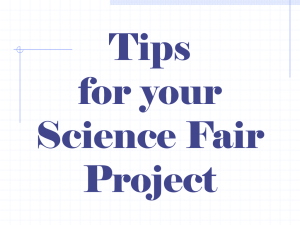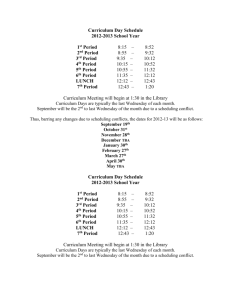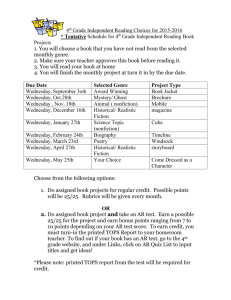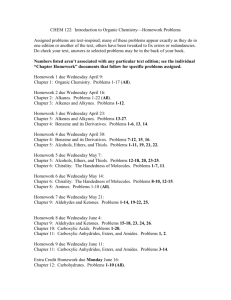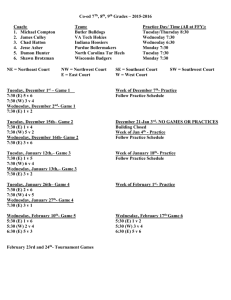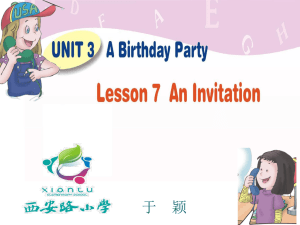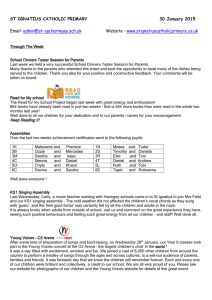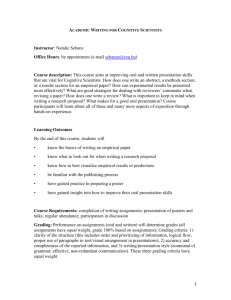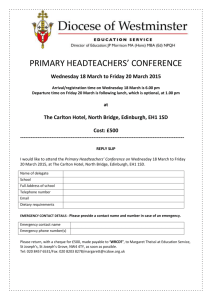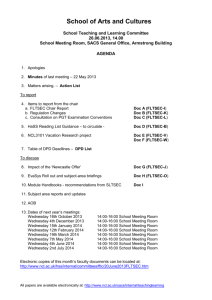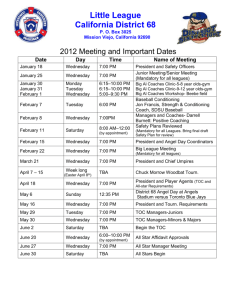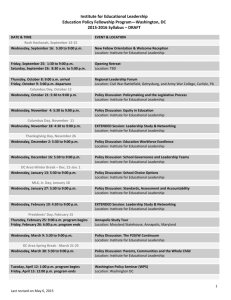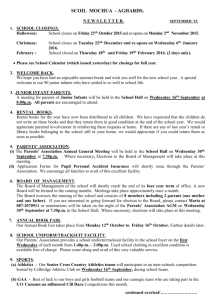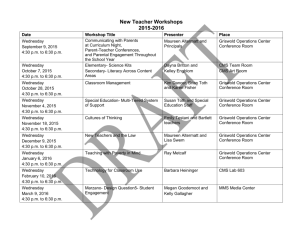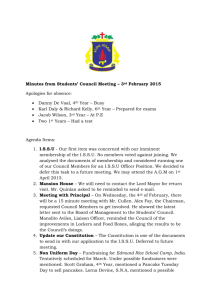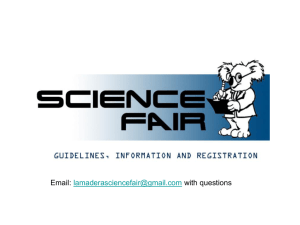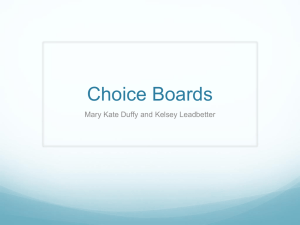PowerPoint Presentation - Lafayette Central Science Fair 2002
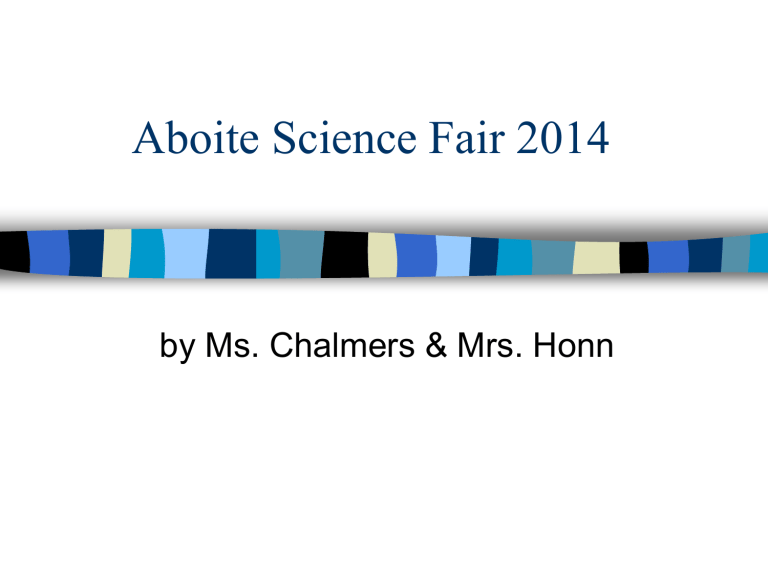
Aboite Science Fair 2014 by Ms. Chalmers & Mrs. Honn
The Goal of Science Fair:
Encourage students’ curiosity
Develop recordkeeping, logic, and critical thinking skills
Give an opportunity for student scientists to share their discoveries with others
Personal pride in work well done
Important Dates:
December 9 - 13: Student information packets sent home .
Begin work on question and research.
Return Entry Forms by 3:30 P.M. Friday, January 17th . Late forms will not be accepted.
January 9, display boards will be available for sale at the school store. First come, first served. Boards will also be available from other sources, such as Michael’s, Walmart, or Meijers.
Wednesday, February 26, Science Fair judging. Plan to bring boards to the SACS Transportation building the day before, unless you make other plans with Ms. Chalmers or Mrs. Honn.
In the event of a snow day on Wednesday, 2/26, the science fair will be held on Thursday, 2/27.
Open house: Wednesday, February 26, 6:00-7:00 P.M. Projects must be taken home on Friday.
Sounds great! But . . .
How do I find an experiment?
While it is tempting to find a book or website that lists projects, this isn’t the best source.
The best science comes from a student’s own questions. Become a good listener. The idea is to make a discovery. The problem with books and websites is that they often give “the answer.” If a resource is used, try making a change so that the experiment’s result is a surprise.
Can I really be a scientist?
Students at AES have a great deal of experience being scientists. Look at old science papers to see how an experiment works. Use your Interactive Science Book to help you set up your experiment correctly.
Getting started isn’t hard!
Pay attention to things that happen around the house or at school.
Look for things that make you wonder.
Anytime you can ask the question “Why?” you are on your way to a great project.
Begin your journal!
Requirement:
Experiment Journal
You must keep a journal as you work on your project. This may be a spiral notebook if you wish.
The journal should list dates, times, and activities that you did, including your thinking and planning.
The original data should be kept in the journal as well.
The Hypothesis
Once you create a question to answer, make a prediction about what will happen in your experiment.
Write the prediction before beginning the experiment.
The important part about keeping track of what you think is that you can look back later and see how much you learned!
Now you are ready to plan:
Materials and Procedure
Think about what you could do to test your question.
Decide what supplies you will need.
Set a schedule to help you use your time wisely.
Keep a journal of the work you do. Make an entry each time you work on your project.
Time to do the experiment!
Be sure to have a control group and groups that test variables.
Watch all parts of your experiment carefully. One of the best parts about research is the surprise!
Keeping track: Data!
As you perform your experiment, it is important to keep track of what happens.
You can take pictures to include in your final project.
Keep measurements like times, sizes, or weights on charts or graphs.
Write notes about interesting things that happen.
What did you discover?
Conclusion
The conclusion is the thinking part of this project.
Compare your hypothesis to what you NOW know!
Explain what you learned by doing your experiment.
What to Include on the Display
Sample student created board
(Fifth grade project)
Title/Question: The question makes an excellent title.
Hypothesis: What was predicted?
Materials: List the supplies used.
Procedure: Write step by step instructions for the experiment & include this in your journal.
Data: Notes, graphs, charts, tables or pictures should be included to show what happened during the experiment.
Conclusion: What did the experiment show? What was learned by doing the experiment?
Display your journal with your project.
Judges are most impressed by projects that are clearly student completed. Generally speaking, neatness is important. Typing your information is strongly encouraged!
Science Fair Day:
Wednesday, February 26, 2014
The Science Fair will be held at the SACS Transportation building on the Aboite campus
(old Indian Meadows building).
The conference area will be available for project set-up between 8:00 and 5:00 on
Tuesday, February 25, 2014.
Look for the signs!
You will be called out of class for the judging on Wednesday morning.
You will have a chance to tell the judges about your project and results.
Celebrating the hard work!
The competition is not the most critical aspect of an elementary science fair.
The main goal is to help students be excited about their own discoveries.
The open house will be held at the
SACS Transportation building on
February 26, 2014 from 6:00
–7:00 P.M.
All students will receive ribbons for participating.
Students enjoy a pizza luncheon.
Five students will be chosen to represent our school at the Regional
Science Fair.
Two students will represent our school at Science Central.
Awards will also be given by special area educators.
The Isaac Knapp Dental Association will present its award if an appropriate project is submitted.
Rules
Displays must not be larger than: 76 cm (30 in.) deep by
122 cm (48 in.) wide by 274 cm (108 in.) tall. Height includes a 36 in. table. Your board must stand alone.
Electricity is available if requested. You must bring your own extension cord (you don’t have to do a judge’s demonstration).
Regional fair rules prohibit the display of animals or plants, food, human or animal parts except teeth, hair, nails or dried animal bones, soil, class III and IV lasers, chemicals or liquids, sharp items, flammable materials, open top batteries or open moving parts. Pictures work well instead.
Regional fair displays MUST include a completed journal .
